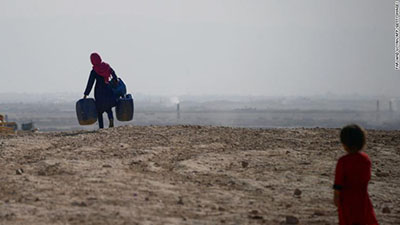By Nick Paton Walsh and Masoud Popalzai
Herat, Afghanistan (CNN)An unprecedented drought in Afghanistan has led to families selling their children just to be able to feed their households.
CNN has spoken to multiple families around the western city of Herat who have been forced from their homes because of a record dry spell that, according to the United Nations, has forced more people from their homes in 2018 than the record violence afflicting the country.
The UN estimates that over 275,000 people have been displaced by the drought, 84,000 of them in the city itself, and 182,000 in the region of Badghis.
Four years of failed rains have savaged the agriculture of the region, and even caused the opium crop to fall by a third this year, despite record output in 2017. The extreme weather conditions are causing concerns that global climate change is having a severe impact on the world's most fragile country, where decades of war have ground the economy and society to dust.
Outside Herat, in a refugee camp, a CNN cameraman met Mamareen, who has lost her husband to the war, her home to the climate and now her daughter to the urgent need to feed her other children. Akila, 6, is now, under the warped economy of this tent city, the possession of another family. Mamareen sold Akila for $3,000 to Najmuddin, who has promised her to his 10-year-old son, Sher Agha.
"I fled my village with my three children because of severe drought," she says. "I came here thinking that I will receive some assistance, but I got nothing. To avoid starvation among my children, I gave my daughter to a man for about $3,000, but have only got $70 so far. I had no money, no food and no breadwinner -- my husband was also killed."
Asked if Akila knew her fate, she said: "She doesn't know that I have sold her. How would she know? She is a child. But I had no other choice. Whether in tears or laughter, she will have to go. Who would sell a piece of her heart unless they really have to?"
A charitable act?

A girl carries empty containers to collect water in Sakhi village on the outskirts of Mazar-i-Sharif, in northern Afghanistan, on July 19. (Getty Images)
Her fate lay meters away, in another, richer tent in the camp, with Najmuddin, her purchaser. Part of this transaction is cultural -- part of the mores of a society where girls have long been traded for dowries rather than being asked for consent. But to Najmuddin, this was an act of charity.
"Her family didn't have anything to eat. They were hungry," he said. "I know I am also poor, but I am sure I can pay it off slowly... in two to three years."
The Afghan cameraman asked, aren't they children? "It doesn't matter. These things happen here. Even an old man marries a young girl. It happens."
Najmuddin is victim of the same drought that has destroyed worlds across western Afghanistan, which was once the breadbasket of the war-torn, landlocked nation. He said: "The wheat crop failed, we couldn't grow melons -- all the other crops failed because of drought. We lost our livestock. The sheep, cows and goats all died of hunger as there wasn't fodder for them."
This was not an isolated case. A man who refused to give his name discussing the sale of his 4-year-old daughter said: "I had no other choice, I had no money and no source of income. The man came here and gave me two options: either to pay back his money or to give him my daughter. I went with the latter."
These devastating decisions come at a time when Afghanistan is reeling from a series of superlatives. Record Taliban control or influence of territory -- at 45% according to the US inspector into the war -- and record civilian casualties. And a very high, yet undisclosed number of Afghan security force deaths, the actual figure being classified by the US and Afghan governments.



